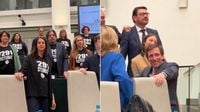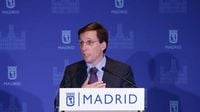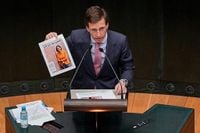In a dramatic and contentious plenary session held on March 25, 2025, at the Palacio de Cibeles, the political landscape of Madrid was once again marred by the echoes of the COVID-19 pandemic's impact. The municipal group Más Madrid, under the leadership of Rita Maestre, drew all eyes by donning black t-shirts emblazoned with the slogan "7.291 Víctimas," a reference to the tragic deaths that occurred in the city’s nursing homes during the pandemic.
As Maestre attempted to bring attention to the implications of these statistics, she engaged directly with the mayor, José Luis Martínez-Almeida of the ruling Popular Party (PP). The session began with palpable tension, as Almeida quickly criticized Maroto for her remarks concerning the deaths, branding them as "asesinatos"—or murders—and expressing that such statements disrespected the memory of those lost.
Almeida, adopting a combative tone, stated that the Madrid City Council would break relations with the Socialist municipal group over these allegations. His reaction was not merely a defense but a strategic political maneuver to assert control and narrative dominance in the face of escalating criticism.
During the session, Almeida unfurled a mountain of photographs and artifacts from Maroto’s tenure as Minister of Industry, Commerce, and Tourism, seizing the opportunity to scrutinize her previous controversial statements. This included remarks made during her time as minister, where she suggested the La Palma volcano represented a "tourist attraction" and her assertion that "Con Bildu mejoramos la vida de los españoles"—translating to “With Bildu, we improve the lives of Spaniards.”
In the midst of this verbal escalation, Almeida did not shy away from labeling Maroto's political journey as one that evolved "from incompetence to indecency, passing through ridicule and corruption," framing the conflict not just as a critique of individual actions but as a broader indictment of leftist governance.
Rita Maestre, embroiled in the fray, attempted to redirect the focus towards what she described as Almeida's neglect of crucial social policies. "A Más Madrid le sobran camisetas y chapas y le faltan votos," Almeida quipped, suggesting that while Más Madrid had plenty of t-shirts and buttons, they lacked genuine public support. This phrase struck a chord regarding the current political climate, highlighting a perceived disconnect between the opposition's protests and its electoral viability.
Amidst the back-and-forth, Almeida's newly heightened narrative included substantial critique of the left's handling of the pandemic crisis, insinuating that their actions, particularly the attendance at the March 8, 2020, feminist demonstration, were responsible for many preventable deaths. He questioned, "How many lives would have been saved in Spain if you hadn’t gone to the march on March 8?" His accusation pointed towards what he deemed irresponsible decision-making during a crucial period when lives hung in the balance.
Maestre, while acknowledging the robust pushback she faced, strategically pivoted the conversation to recent tragic events, including the alleged murder of a caretaker in Extremadura. In doing so, she sought to spotlight the ongoing need for effective social services, retorting, "What would have happened if this occurred in Madrid? Almeida would have simply expressed sympathy but claimed no responsibility." Such remarks were aimed at underlining the failures in service delivery that have characterized the current administration.
The session morphed into a battleground where comments on the pandemic became a microcosm for broader societal failures, illustrating the division not only in political ideologies but also in the handling of real human tragedies. Almeida continued his assault, noting that many families of the deceased were left to grapple with a lack of transparency, claiming, "What we need to know is how many died really from the pandemic," accusing the national government under Pedro Sánchez of covering up the actual statistics.
Instead of swaying towards resolution, the plenary session took an emotional turn as it revived the scars of pandemic management failures, with both parties trading accusations that revealed nothing short of deep-seated animosity.
As the arguments grew fiercer and delegation's resolve hardened, the poignant imagery exhibited by the Más Madrid group became not just a clothing choice but a symbol of the desperate cries for accountability and justice for pandemic victims. This marked a particularly crucial point in political discourse in Madrid—a point where emotion and memory were woven into the fabric of political strategy.
Despite the uproar, Maestre engaged her audience through social media, asking, "¿De qué se ríen?" (What are they laughing at?), a poignant question targeting the dismissive reactions from Almeida and his party, suggesting a growing chasm between public sentiment and political performances.
In an era dominated by divisive political narratives, the events of the plenary session in Madrid present a critical moment of reflection for both constituents and leaders. The magnitude of the COVID-19 losses cannot be reduced to mere political fodder; it requires an empathetic approach towards understanding and healing the emotional wounds for countless families still reeling from their losses.
The documentary "7291," aired recently on RTVE, reignited public interest in the tragic narrative of those nursing home deaths, serving as a stark reminder that behind every statistic lies a human story—a parent, sibling, or grandparent whose life was affected by an administrative failure. As political entities jockey for position, the challenge remains to move beyond rhetoric into genuine policy reform that addresses the rights and memories of those who suffered.






